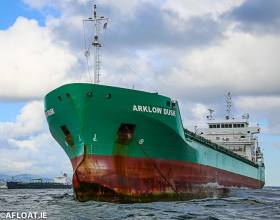Displaying items by tag: Ships Anchored
#dublinbay- It was a busy scene in Dublin Bay during the May Bank Holiday as up to seven ships were at anchorage among them an Irish flagged cargo which stood out with its distinctive green painted hull, writes Jehan Ashmore.
The ship Arklow Dusk is the fourth and final of a quartet of 11,000dwt sisters acquired last year by Arklow Shipping following the bankruptcy of the Dutch based Flinter Group in 2016. The remaining sisters include Arklow Dawn, Dale and Day.
Acquisition of the former Flinter America and fleetmates as secondhand tonnage is unusual for ASL as the Co. Wicklow based company notably in recent years have taken delivery of newbuilds of various designs from Dutch and German shipyards.
Arklow Dusk had previously docked in Dublin Port after a voyage from Bilbao, Spain. On board was a cargo of cement products that were discharged alongside Ocean Pier. This was the first time the 132m double-hold cargoship made a call to the capital.
On completion of unloading, Arklow Dusk proceeded 'light' to Dublin Bay to anchor in the early hours of Thursday night. On the Bank Holiday Monday, the arrival of cruiseship Norwegian Pearl stood out and as the inaugural caller of the season to Dun Laoghaire Harbour.
The presence of these seven ships on Monday was short lived as by mid-morning Arklow Dusk having awaited orders departed. The 'D' class ship was bound again for Spain but this time to Carino located in north-west of the Iberian nation.
As Arklow Dusk set a southbound course along in the opposite direction came Schelde Highway from Zeebrugge, Belgium. The vehicle-carrier headed into the bay to occupy the same area where the Arklow-registered cargoship had taken up anchorage for more than four days.





























































